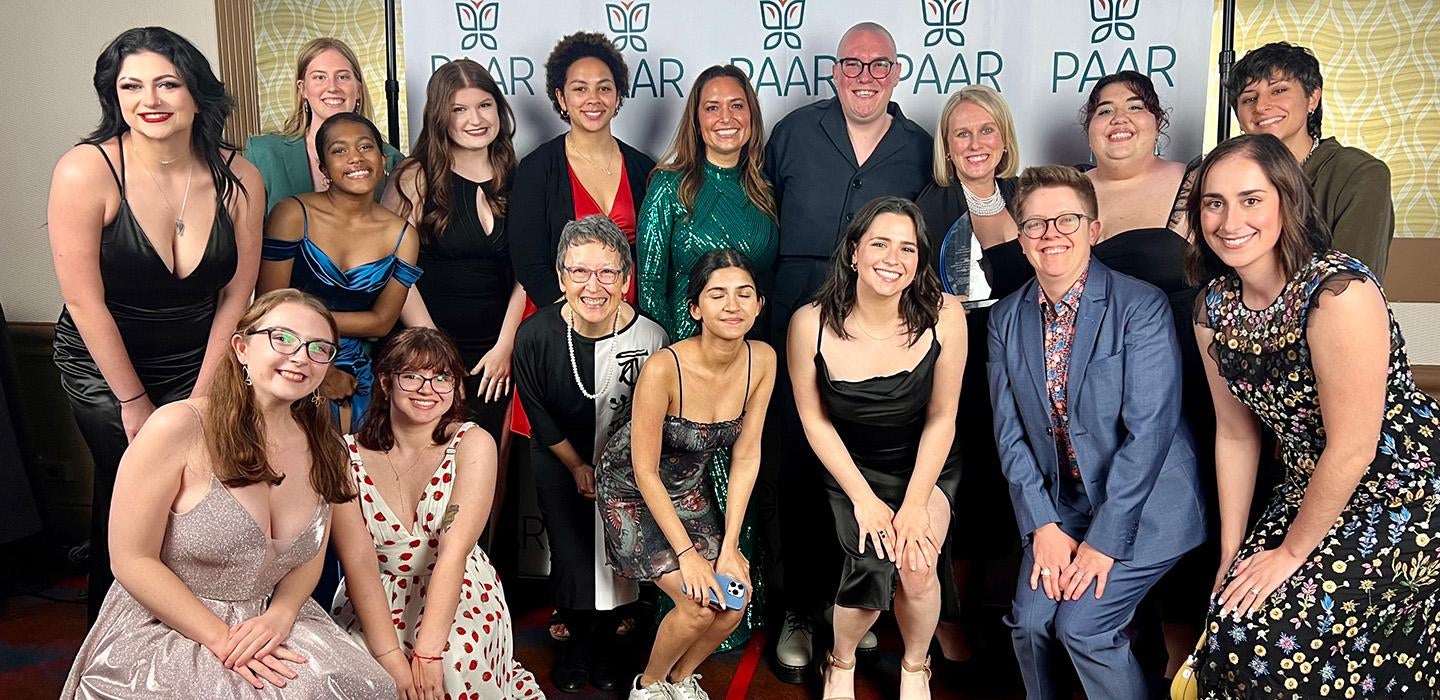
Subscribe to Pittwire Today
Get the most interesting and important stories from the University of Pittsburgh.A crowd of supporters joined Carrie Benson and the Prevention at Pitt team as they received the 2024 Community Champion Award from Pittsburgh Action Against Rape (PAAR).
“I think having an acknowledgement from PAAR feels different than acknowledgement from just about any other entity,” said Benson (EDUC ’12G), director of sexual violence prevention and education in Pitt’s Office for Equity, Diversity and Inclusion. “For me, personally, PAAR is the gold standard. They do incredible work to support survivors.
“For an organization who does what they do so well, who’s so survivor-centered, to say: ‘Hey, we see you and we think you’re doing a great job’ — it’s really validating and it’s incredibly meaningful,” she said.
Each year, PAAR hosts the Teal Ball to honor and celebrate the strength of survivors of sexual violence while recognizing those who help eradicate sexual violence in the Pittsburgh community. This year’s ceremony, the 52nd, was held at the Wyndham Grand Hotel in downtown.
The University team was represented at the Teal Ball by Benson, Dev Hayostek (SOC WK ’23G), Angie Jack, Willa Campbell (SPH ’23G) and Chad Jurica, along with graduate students Leigh Marques and Kelisa Hysenbegasi and undergraduate students from Pitt’s Sexual Assault Facilitation and Education team.
The Community Champion Award honors an organization that identifies a community need, takes decisive and effective action to fulfill that need and inspires others in the process. Prevention at Pitt’s honor comes after a period of steady and significant growth, fueled in part by a $500,000 Pitt Seed Grant in 2023 that was awarded following several new initiatives, including the Circle Up program, launched in 2022.
In 2020, the University’s sexual assault prevention team included just one full-time staffer and a group of volunteer student peer-educators, Benson said.
“There was some really great work being done on campus at the time by the University Counseling Center and the Student Health Center,” she said. “But a real push began following the 2019 campus climate survey, when we realized that too many of our students were experiencing intimate-partner violence. Chancellor Patrick Gallagher really saw a need to invest resources in the prevention of sexual misconduct — not just in the response to it. Since then, we’ve been very fortunate that we’ve been allowed to grow.”
In addition to Benson, two full-time staff educators, Campbell and Hayostek, are now dedicated to sexual assault prevention and education. The office also has two associated faculty members conducting research, three graduate students facilitating the Circle Up program, four undergraduate prevention assistants and 30 undergraduate students trained in peer education. Prevention at Pitt also has an advisory council of undergraduate and graduate students who provide advice and feedback.
The office also partners with Pittsburgh Action Against Rape, the Women’s Center and Shelter of Greater Pittsburgh and other community nonprofits focused on sexual assault prevention and response.
“PAAR and Pitt have had a connection for far longer than I’ve been here,” Benson said. “They have always been willing to support our students, staff and faculty. What’s really changed in the last few years is that they have regular office hours on campus, in the OEDI office. That was a big step in our relationship. Not only does it provide a service to our students — it makes it easy to connect survivors to advocates from PAAR — but it also allows us to have a regular check-in every single Wednesday. We’ve forged a community together.”
Campbell, who worked as a PAAR advocate before pursuing her master’s degree in public health at Pitt, says the organization’s resources and expertise go beyond what the University can offer, especially when survivors of sexual assault interact with the criminal or civil legal system.
“They also provide medical advocacy,” the prevention educator said. “They can be in a hospital room with a survivor when they’re getting medical care. They can also connect people with mental health counseling. They are the experts and they really complement what we can do on campus.”
Although the recognition is gratifying, Benson and Campbell say their work is far from over.
“We have a long road ahead, because there’s a lot of work that has to go into shifting the culture and attitude — that will really be what reduces and helps to end sexual violence,” Campbell says. “We’re very excited by the honor, and it gives us some wind in our sails, so to speak, to push us forward.”
For more information about Prevention at Pitt, visit pitt.ly/prevention.
— Jason Togyer, photography courtesy of Carrie Benson


